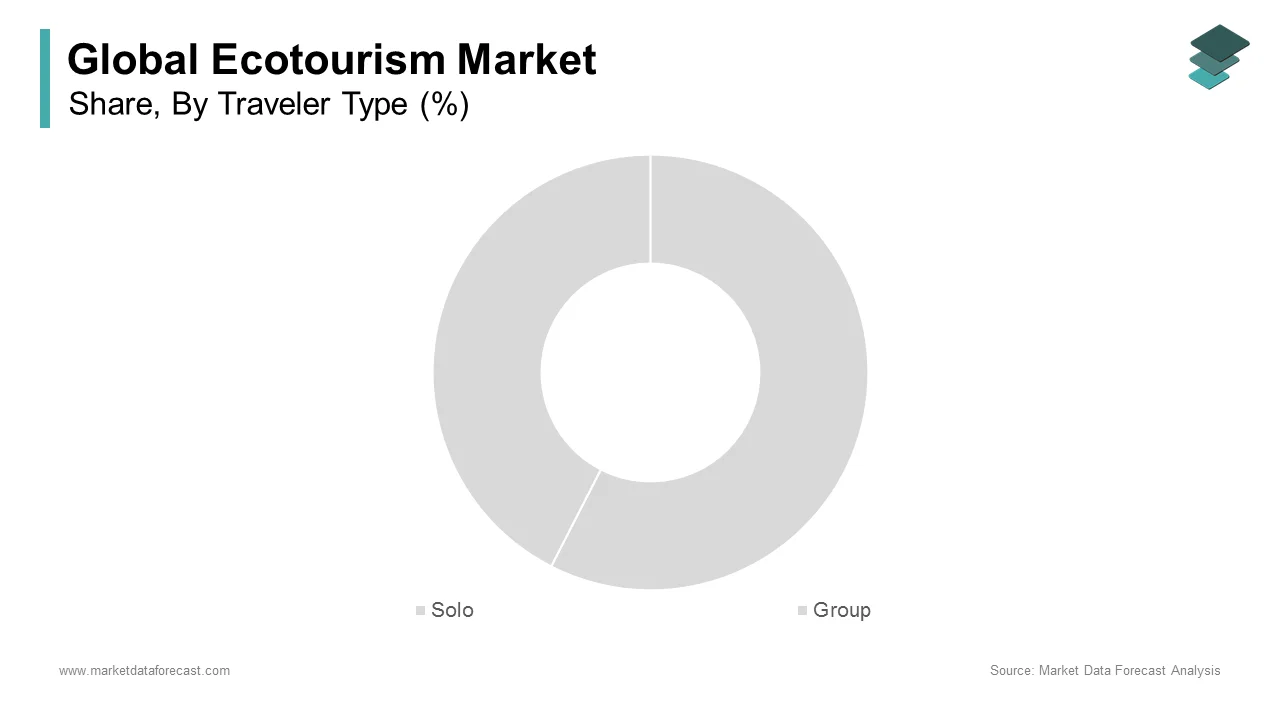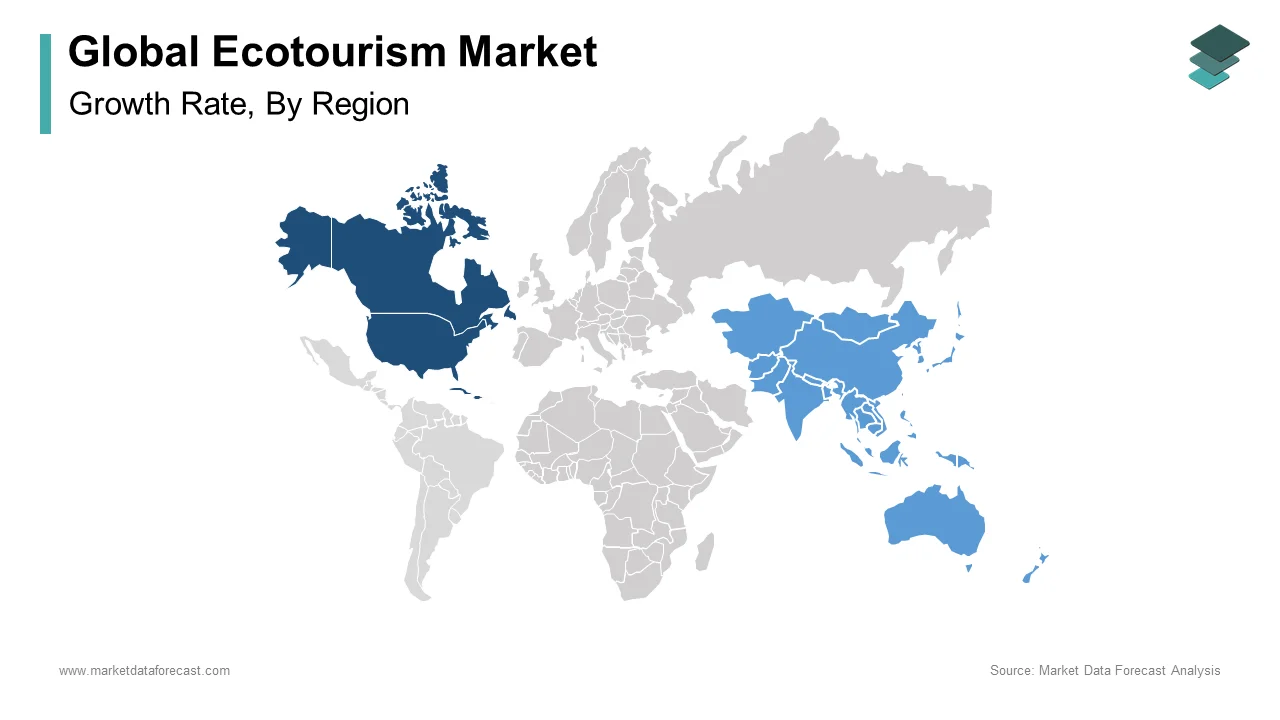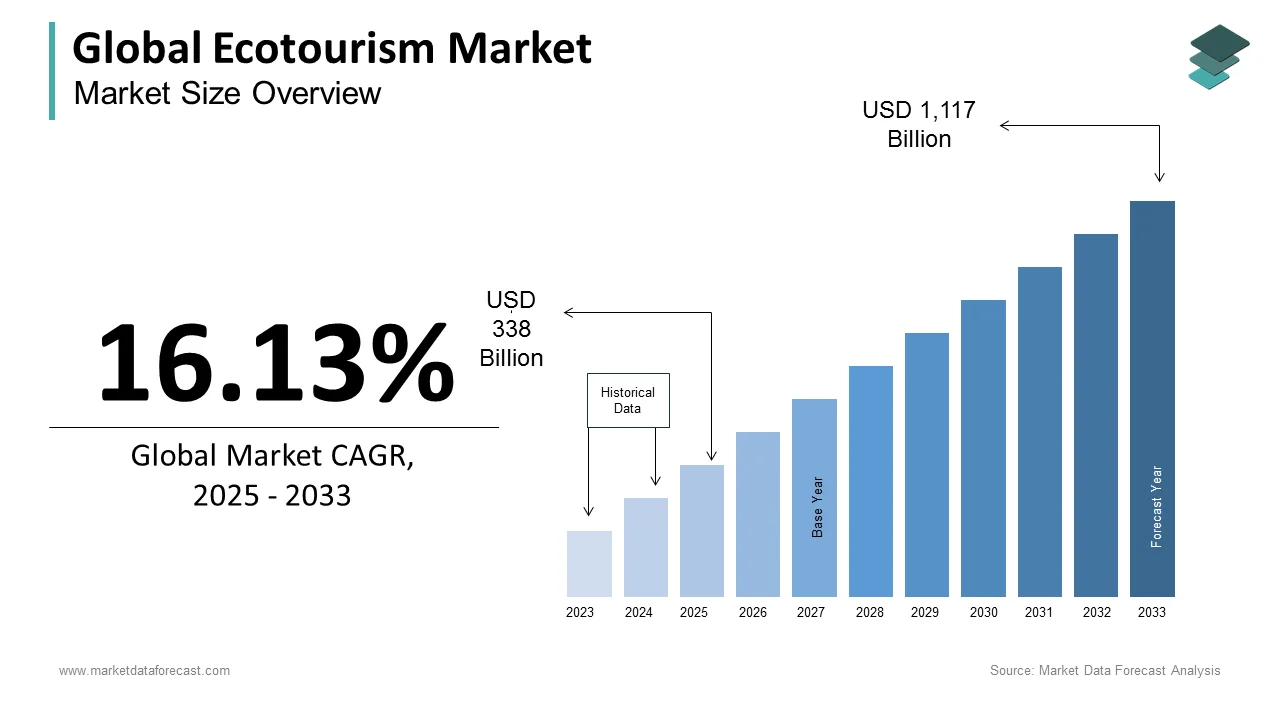Global Ecotourism Market Size, Share, Trends & Growth Forecast Report By Traveler Type (Solo and Group), By Sales channel (Travel agents and Direct) and Region (North America, Europe, Asia-Pacific, Latin America, Middle East and Africa), Industry Analysis From 2025 To 2033.
Global Ecotourism Market Size
The global ecotourism market size was worth US$ 291 billion in 2024 and is anticipated to have a value of US$ 1,117 billion by 2033 from US$ 338 billion in 2025 and to reach the register a CAGR of 16.13% during 2025-2033.
Ecotourism is a kind of travel that places a strong emphasis on protecting the environment. This kind of travel falls under the category of sustainable travel, which aims to have a minimal negative impact on the environment. Ecotourism includes activities like homestays, eco-tours, national parks, and wildlife sanctuaries. The ecotourism sector of the global tourism business is rapidly growing and has established itself as one of the most significant subsectors.
Ecotourism is traveling to a remote, undeveloped area where the local fauna, flora, history, and culture are the main attraction. The appeal of travel and tourism to unusual locations has increased globally. Tourism to distinctive eco-destinations is growing in popularity in places like Iceland, Kenya, Palau, and Nepal. The growth of the ecotourism industry is credited to rising environmental protection awareness, alluring vacation packages, sustainable development, and low prices. Ecosystem conservation through sustainable tourism in natural areas. These qualities are linked to market growth and significant possibilities for travel agencies and tour operators worldwide. It financially benefits the local host.
The preservation of natural areas, the welfare of locals, and interpretation and education are further benefits of ecotourism. It is backed by a global network of people and organizations committed to informing tourists and tourism industry professionals about environmental challenges. It benefits regional and private enterprises and offers efficient and affordable incentives for boosting bio-cultural diversity. The travel and tourism sector is growing, and it is currently outpacing conventional mass tourism. A form of tourism known as ecotourism places a strong emphasis on protecting the environment. It fits into the notion of sustainable tourism, which strives to have as little of an adverse effect on the environment as possible.
MARKET DRIVERS
Rising Popularity of Outdoor Activities
Due to increased urbanization and rising income levels, outdoor leisure activities, solo travel, and immersion travel are becoming increasingly popular, which is fueling the global ecotourism market's expansion. In addition, the top hotel companies are implementing novel and creative ways to build eco-lodges and camps, plan trails and excursions, and spend money on social media marketing efforts. In addition to analyzing the environmental and cultural aspects of ecotourism, they are also working on projects that support recycling, put an emphasis on energy efficiency, and reuse water, all of which help to provide local populations with economic opportunities. This, in turn, is promoting market expansion. The governing bodies of several nations are also promoting ecotourism through outreach, instruction, information services, and partnerships with private businesses, which is projected for global ecotourism market growth.
Major factors are credited to the nations that provided the growth factors, such as Nepal, which is the trending hotspot among distinctive eco-tourism locations worldwide and saw a remarkable 24% increase in passengers in 2020, totaling 1,172,052 at the end of the year. Similarly to this, Kenya saw a 35.7% increase in visitor arrivals in 2019, surpassing the two million mark. Eco-tourism is currently a hot topic in places like Costa Rica, the Galapagos Islands, and Panama. Other growing causes include the adoption of various efforts by governments throughout the world to assist traveler safety and security, expanding the reach of tourism by increasing the number of international visitors.
MARKET RESTRAINTS
Insufficient Support Infrastructure at Ecotourism Sites
The major restraints to the growth of ecotourism include insufficient support infrastructures at ecotourism sites, such as poor air, train, and road access to various ecotourism destinations in emerging and undeveloped countries. The inadequate availability of quality and hygienic restaurants, food outlets, and accommodations at the destination, especially in developing nations, hinders the expansion of ecotourism tourists' arrival. The monopoly of a select few tour operators and the scarcity of certified, trained guides further increases the risk of exploiting tourists.
REPORT COVERAGE
|
REPORT METRIC |
DETAILS |
|
Market Size Available |
2024 to 2033 |
|
Base Year |
2024 |
|
Forecast Period |
2025 to 2033 |
|
CAGR |
16.13% |
|
Segments Covered |
By Traveler Type, Sales Channel, and Region. |
|
Various Analyses Covered |
Global, Regional & Country Level Analysis, Segment-Level Analysis, DROC, PESTLE Analysis, Porter’s Five Forces Analysis, Competitive Landscape, Analyst Overview of Investment Opportunities |
|
Regions Covered |
North America, Europe, APAC, Latin America, Middle East & Africa |
|
Market Leaders Profiled |
Adventure Alternative Ltd, Arcari Travel, Frosch International Travel, Inc., G.Adventure, Intrepid Group Limited, Small World Journeys Pty Ltd, Rickshaw Travel Group, Steppes Travel Group Travel Leader Group, LLC, Undiscovered Mountains Ltd, and Others. |
SEGMENT ANALYSIS
By Traveler Type Insights

Group travel is a factor in this global ecotourism market's expansion because more than 50% of the world's population always travels in groups of two or more. The industry is constantly expanding because the cultures and histories of every nation constantly describe the attitudes of people who travel, which begins with finding groups for their exploration of locations for ecotourism. Many nations are making larger contributions to group travel. For instance, the market for group travel has grown by 10% to 15% a year, which presents an opportunity for the major players to set up certain packages for groups for ecotourism vacations.
On the other hand, the sector of travelers who travel alone is expanding as a result of the market's leading trend. From 2022 to 2027, there will be a considerable 5–15% increase in solo travel, which motivates travel agencies and organizations to offer services for both solitary travelers and groups.
By Sales Channel Insights
Direct travelers hold a dominant position in this segment because everyone now has access to technological advancements. They try to save money by exploring more by searching in that location only according to their requirements, and visitors do not have to be constrained by having only one option for themselves. However, there is an opportunity for the players in this market.
The market for travel agents is expanding quickly, but technological advancements and increased consumer awareness of prices and options are limiting segment growth. However, they have specialized trained tourist guides who need more exposure to the destination, and major key players are giving them access to digital platforms so they can have trained guides with them while exploring popular ecotourism destinations.
REGIONAL ANALYSIS

The region leading these markets with a CAGR of 16.8% in 2023 is anticipated to increase by 8.9% annually over the foreseeable period in North America. The main criteria influencing how quickly people are using digital media to research travel to new places and how many of them are environmentally conscious travelers are used to predict this region's market growth.
The Asia-Pacific region is holding the second-largest market share of these ecotourism markets. The abundance of ecotourism destinations in this region and the large number of travelers that come here for their travels are the main drivers of its expansion.
KEY MARKET PLAYERS
Companies playing a prominent role in the global ecotourism market include Adventure Alternative Ltd, Arcari Travel, Frosch International Travel, Inc., G.Adventure, Intrepid Group Limited, Small World Journeys Pty Ltd, Rickshaw Travel Group, Steppes Travel Group Travel Leader Group, LLC, Undiscovered Mountains Ltd, and Others.
RECENT MARKET HAPPENINGS
- The community initiative to reforest the Sacred Valley of the Incas, Valle Sagrado Verde, is one that Aracari is happy to express its support for.
MARKET SEGMENTATION
This global ecotourism market research report has been segmented and sub-segmented based on traveler type, sales channel, and region.
By Traveler Type
- Solo
- Group
By Sales Channel
- Travel agents
- Direct
By Region
- North America
- Europe
- Asia Pacific
- Latin America
- Middle East & Africa
Frequently Asked Questions
1. What can be the total Ecotourism market value?
The Ecotourism Market size was worth US$ 291 billion in 2024 and is anticipated to have a value of US$ 1,117 billion by 2033 with a CAGR of 16.13% during 2025-2033.
2. Mention the region which has the largest share in the ecotourism market?
The North American region is expected to have the largest market share of the global ecotourism market.
3. Name any three ecotourism market key players?
Small World Journeys Pty Ltd and Rickshaw Travel Group Steppes Travel Group are key global ecotourism market players.
4. What is the major effecting factor in the global ecotourism market?
Political chaos and terrorism, on the other hand, have had an impact on the overall amount of international travel and choice of location and are the main restraints on the Ecotourism market in the upcoming years.
5. Mention the latest driver in the global ecotourism market?
The governing bodies of several nations are also promoting ecotourism through outreach, instruction, information services, and partnerships with private businesses, which is projected for global ecotourism market growth.
Related Reports
Access the study in MULTIPLE FORMATS
Purchase options starting from $ 2500
Didn’t find what you’re looking for?
TALK TO OUR ANALYST TEAM
Need something within your budget?
NO WORRIES! WE GOT YOU COVERED!
Call us on: +1 888 702 9696 (U.S Toll Free)
Write to us: sales@marketdataforecast.com
